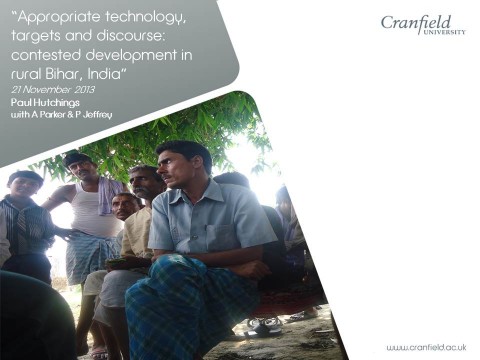Various papers and presentations from ECRWASH Conference 2013 at Cranfield University, UK
Various authors (2013)

Published in: 2013
Publisher:
Cranfield University, UK
Author:
Various authors
Uploaded by:
SuSanA secretariat
Partner profile:
common upload
6313 Views
97 Downloads
Content - Summary
This library entry contains material from the first Early Career Researchers in Water, Sanitation and Hygiene (ECRWASH) conference held at Cranfield University on 21 November 2013.
The documents provided are those where permission from the authors was obtained. Thank you to the authors for giving their permission.
The full programme for the day included:
+++++++++
Keynote Speaker:
Frances Cleaver (Professor of Environment and Development, Kings College London), “Adaptive Water Governance: Critical Institutional Perspectives”.
Michael Rouse CBE (Distinguished Research Associate, University of Oxford), “WASH – where are we now, and what do we need for the future”.
+++++++++
Session 1a: Water Safety Plans
1 - Grace Oluwasanya (Federal Institute of Agriculture, Abeokuta), Lessons from success stories, transferable or not? A review of water safety plans implementation.
2 - Sarah Pipe (Mott Macdonald) Catchment Management for the River Na.
3 - Hafizah Hasan (Cranfield University), Water Governance and Issues: From Water Safety Plans Perspective.
+++++++++
Session 1b: Faecal Sludge Technology Treatment and Re-use
4 - Stephanie Connolly (University of Glasgow), Scale down of industrial wastewater treatment systems to meet the challenges of sewage treatment in the peri-urban environment.
5 - Chris Rose (Cranfield University), Faecal sludge as a feedstock for anaerobic digestion and the re-use of its outputs.
6 - Robert Dillon (National University of Ireland Galway), Ecologically engineering anaerobic digesters to cope with high solids waste from pit latrines.
+++++++++
Session 2: Technologies in WASH
7 - Gavin Collins (National University of Ireland Galway/Univeristy of Glasgow), The transforming waste consortium: A socio-technical approach to sanitation in peri-urban environments in developing countries.
8 - Jamie Radford (Mott MacDonald), Developing a safe simulant for faecal sludge.
9 - Ben Martin (Cranfield University), Reinventing the toilet: using pervaporation membrane and hydrophilic/hydrophobic condensing media to produce pathogen free water in situ.
10 - Matthew Waterkeyn (Mott MacDonald), De-mystifying geospatial technology; a case study in capacity building in GIS and GPS.
+++++++++
Session 3: Improving access to WASH
11 - Simon Taylor (Cranfield University), A realist evaluation investigating the impacts of an action research project aiming to build capacity in WASH technology assessment.
12 - Nicola Greene (Loughborough University), Seasonal access to water and sanitation in Kermi village, Humla District, Nepal.
13 - Paul Hutchings (Cranfield University), Appropriate technology, targets and discourse: contested development in rural Bihar, India.
14 - Divesh Mistry (Mott MacDonald)Lessons from the Pakanae water supply.
+++++++++
Posters:
- Yussif Abdul-Rahaman (Pumping is Life, Ghana)
- Emmanuel Sachikumba (University of Zambia)
- Ruth Kennedy-Walker (Newcastle University)
- Nazmun Naher (WaterAid, Bangladesh)
- Simeneh Gebeyehu (UNHCR-Ethiopia)
- Kirsty Upton (Hydrogeologists without Borders UK)
ECRWASH website: http://www.safad.org.uk/?page_id=534
Twitter discussion hashtag: #ECRWASH13
Bibliographic information
Various authors (2013). Various papers and presentations from ECRWASH Conference 2013 at Cranfield University, UK. Cranfield University, UK
Filter tags
English Europe & Central Asia Faecal sludge treatment processes Presentations














